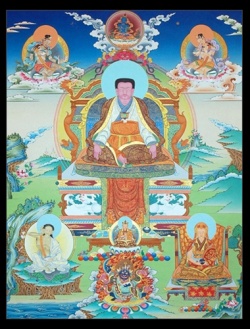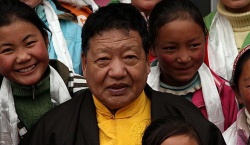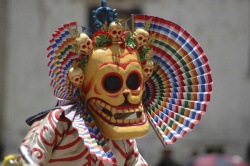On real time Buddhist pastoral care and the experience of loss when a lama dies
by Repa Dorje Odzer
The past week has been a tough one for the Kagyu lineage. Recently the great Karma Chagme Rinpoche passed away in New Delhi, and one of the first trailblazers of dharma in the West, Akong Rinpoche, along with two travel companions was murdered in Eastern Tibet. Needless to say, these two important lamas impacted the lives of many, many, people who practice dharma, and in the case of Akong Rinpoche many Tibetans who passed through the schools and hospitals that he was instrumental in building in Tibet.
I had the wonderful pleasure of receiving the transmission of Rāga Asya’s (the 1st Karma Chagme) The Union of Mahamudra and Dzogchen in New York City when he was traveling through the United States in 1998/99. Both Karma Chagme Rinpoche as well as his son Sangtrul Rinpoche took turns teaching the text line by line- it was an extraordinary privilege to be there for such a transmission. Years later, in 2005, I visited Karma Chagme at his monastery in Pharping where I was fortunate enough to receive Namchö Amitabha from him, which in a way was like receiving it from Amitabha himself. His Holiness, the Gyalwang Karmapa’s letter of condolence regarding Karma Chagme’s death can be seen here.
I never had the pleasure of meeting Akong Rinpoche, although I did visit Samye Ling during the summer of 1995. Samye Ling was (and continues to be) a vital center for the preservation and teaching of the Kagyu lineage. You can read His Holiness’ statement of condolence regarding Akong Rinpoche’s death here.
Without a doubt, my limited relationship to these masters pales in comparison to the stories of others, especially those who were direct disciples of these two great teachers, yet I thought that I would share the way in which I came to develop my own personal relationship with them. Even if all we have seen is a photo of them, or read a text or teaching by them and not actually met them then we still have a connection with them. In fact, physical proximity is not necessarily very important if you can hold the connection between yourself and a lama within your heart. After all, where is the lama? Where is the lama’s mind? Is there an edge, or separation, that keeps us away from constantly being able to experience the wakeful luminosity of the lama?
There is a real sense of loss with the passing of these two Rinpoches that has stuck with me in a way that I am trying to better understand. I rejoice in all of their activities and pray that their activities continue to flourish, and yet I am very aware of the temporary break in the immediate benefit that these teachers manifest. Ultimately, it is okay to feel sad and upset, these feelings -all thoughts/feelings that arise in fact- are okay. If we can hold whatever arises as pure appearance, as the arising of thought as-the-lama then there is no loss of intimate connection with the lama, no separation and no real loss other than the physical lama
I was very moved to learn of the visit that His Holiness Karmapa and His Eminence Goshir Gyaltsab Rinpoche made to Karma Chagme before his death. An account of that visit can be seen here. As a hospice chaplain, I felt that His Holiness and His Eminence were modelling a sense of spiritual care that I could identify with. I find that there was a profound teaching in seeing two great masters going to be with another great master as he approached the end of life. I saw a reflection of them in the work I do. In my case it is one ordinary person going to be with other ordinary people who are in the process of dying or who have just died, yet the level of intimacy and connection that can occur between two people under these circumstances is much more profound than we often give credit. What’s more, that level of caring, a natural compassionate resolve, in which two very busy lamas take time to visit one who is dying is something that we can all learn to blend into our own busy lives. Perhaps we can also start to drop the enduring experience of ordinariness too, but that should be the topic of another blog post.
Death is often seen as a passing, as a separation, and as an ending. Trying to see it otherwise, or trying to allow myself see death more clearly for what it is, is one of the things that keeps me refreshed and motivated in the work I do. I also feel that there is a link to the way we see death, the way we relate to it, and the way that we see our own minds; the way that we relate to everything that appears. A mind full of fear of death is a mind plagued by duality and is therefore unable to rest in the natural vastness of it’s essential nature with ease. As we begin to familiarize ourselves with the mind as deathless, as expansive luminosity, then we simultaneously seem to develop more equanimity around what death may be. As a relative expression of death Karma Chagme’s death seems to reveal the power of his realization as he sat in thugdam for several days. Akong Rinpoche’s death reminds me of many things, it was “ordinary” in a way that Milarepa’s death appeared. It was also sudden and violent, two things that we often shy away from as practitioners of dharma- two things we often try to avoid. There is a lot in this, a lot in dying in a manner that most Buddhists seem to want to shy away from. Most of the time I think we see our deaths as knowable and slightly intentional in that we generally want to be prepared for it as it comes. We cannot always do that; death is unavoidable. Death is inevitable. It comes when it does.
As a lineage, we have lost two very important and influential masters. The question now very well may be; “where do we go from here”? At times like this, when experiencing moments of sadness and loss, it is nice to be told what we should do. Yet this is the critical moment in which perhaps we can benefit the most in taking some quiet moments to reflect upon and review all that these masters have given us. If we can spend time cultivating gratitude for each instruction, each display of teaching, each kind supportive glance, and bolster within ourselves the resolve to continue to practice what they have given us with the intent of resting in the display of appearance as no different than the lama, then we have touched upon something wonderfully profound. If we can continue with what we committed to ourselves to and bring all that arises with loss onto the path rather than shut down, hibernate in a feeling of shock, and let all certainty fade, then we are practicing the ultimate guru yoga.
If we can do this it seems that many questions and fears naturally dissipate. It doesn’t necessarily mean that we become naturally happy and that life turns around, but that we continue to remain in union with the essence of the lama, always open to their blessings, always part of their lineage. This can lead to certainty in the dharma and the realizations that dawn from an engaged dharma practice. This experience of certainty helps aide us in developing natural ease in our experience of mind so that we have definitive understanding, the experience of natural knowing or resting in the nature of our minds. In this way, no matter where we happen to live, no matter what cultural mores we follow, or no matter what language we speak, no matter what gender or sexual orientation, no matter if we practice in a fancy dharma center, or a scrappy one, or our simple homes, we take a seat amongst Tilo, Naro, Marpa, Milarepa, the incomparable physician of Dakpo and everyone who passed the enduring nectar of dharma from vessel to vessel throughout time.
My thoughts and prayers go out to all students of Karma Chagme Rinpoche and Akong Rinpoche, may your practice deepen and may their activities continue throughout time and space! May we all finally gain certainty in resting in the experience of lama-as-experience! Gewo!


